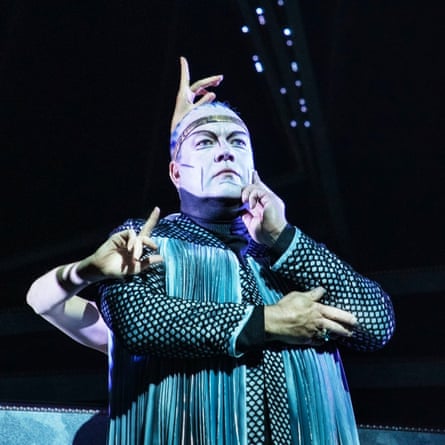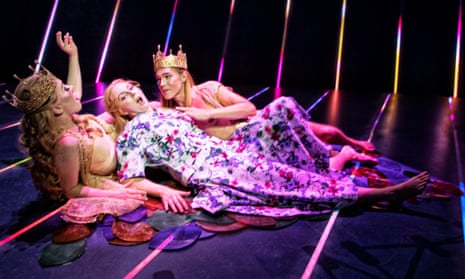For a Danish composer who has written a much admired, glittering ensemble piece called Schnee (Snow), the idea of basing an opera on Hans Christian Andersen’s Snedronningen (The Snow Queen), one of his country’s most celebrated stories, must have seemed irresistible. Hans Abrahamsen has cherished the idea of such a work for many years, and it’s now finally reached the stage, given its premiere by the Royal Danish Opera, in a production by Francisco Negrín, conducted by Robert Houssart.
Andersen’s “tale in seven stories” is one of his longest and most intricate fables, depicting the efforts of a young girl, Gerda, to find and rescue her boy-next-door friend Kay, who has been bewitched by the Snow Queen and spirited away to her ice palace in the far north. Abrahamsen and his librettist Henrik Engelbrecht have pared the story and its characters right down, and Negrín’s staging takes the process even further, making three of the characters, the Snow Queen, the Reindeer and the Clock, who are all sung by the same baritone in Abrahamsen’s score, into manifestations of a single “universal being”.
Unfortunately, the production takes a great deal more out of the opera as well. There’s no sense of any background to Gerda’s quest, no indication of the passing of time and the changing seasons, or of the symbolism of roses, which are regularly referred to in the libretto; not even any suggestion in Palle Steen Christensen’s drab, unevocative sets (with costumes by Louis Désiré) of the chill and the snow that makes her search so gruelling. What’s left is a rather mundane rite-of-passage story, which is somehow shaped by the hazily defined universal being, and is rather patchily told onstage. The addition of two dancers to the cast, one representing the Snow Queen, the other the Reindeer, just seems crass and distracting.

More crucially, the staging fails to support what’s implicit in Abrahamsen’s score, which is full of wonderful ideas but which sometimes fails to take charge of the drama as it could. Everything seems one-paced, towards the end of the second act especially, and it’s revealing that the most striking music in the opera comes in the extended orchestral sections, especially the wild passage that signals the appearance of the Snow Queen in the first act, and the music that opens the third, sounding as if Wagner’s Flying Dutchman overture has been refracted through the prism of spectralism.
The vocal writing is assured if never spectacular for its own sake, and always supported by glinting webs of orchestral sound, through which kernels of melody develop and grow. The central role of Gerda was conceived for Barbara Hannigan, the soprano for whom Abrahamsen wrote his extraordinary song cycle Let Me Tell You, and she will sing it when the English version of the opera is staged in Munich in December. Here, with the text in Danish, the role is taken by Sofie Elkjær Jensen, who may not have Hannigan’s stage presence, but certainly has all the high-register ability her role demands.
Melis Jaatinen is the rather subdued Kay but, like Johan Reuter, who takes on the three characters merged into the universal being, she doesn’t have a great deal to get her teeth into. In the triple role of Gerda’s grandmother, an old lady and the Finn Woman, Johanna Bock has more to work with and makes the most of it, though again the production doesn’t give her much scope, but then Houssart’s conducting, which often seems too cautious and too slow, can’t have given any of the cast much encouragement.

Comments (…)
Sign in or create your Guardian account to join the discussion